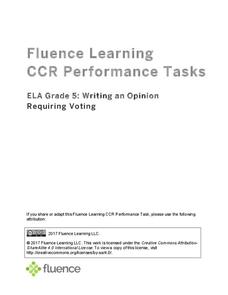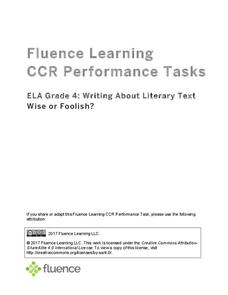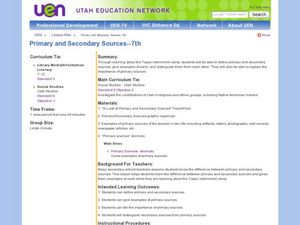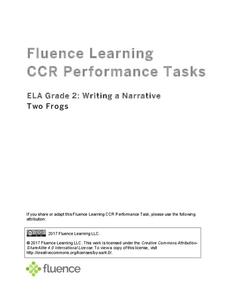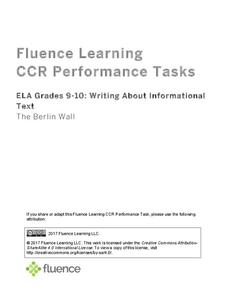Learning Express
501 Writing Prompts
Never again will you need to worry about coming up with a writing prompt! This packet contains, as it says, 501 prompts that are suitable for fourth graders on up. The prompts are paired into four categories (persuasive, expository,...
Fluence Learning
Writing About Informational Text: Music and the Brain
Even if you've never picked up a musical instrument, chances are that music has directly impacted your mental and emotional development. Sixth graders engage in a reading activity in which they read two articles on the impact of music on...
Curated OER
Examining Secondary Sources: The American Revolution
Learners who have a grasp on the events of the Revolutionary war view clips from five different films as secondary sources. They take notes on each clip thinking about historic inaccuracies. They then view parts of the film The Patriot...
George W. Bush Presidential Library and Museum
Teaching Primary and Secondary Sources
What makes a source primary or secondary? Middle schoolers read a definition of each term before exploring different examples and applying their knowledge to a research project.
Curated OER
Developing Writing Skills Through Japanese Folk Music
Students listen to Japanese folk songs to get inspired to create a writing piece about Japan. In this writing lesson, students use primary and secondary sources to add information about Japan.
Fluence Learning
Writing Informative Text: Did Shakespeare Write Shakespeare?
William Shakespeare penned some of the richest and most fascinating works of literature—or did he? Middle schoolers read three brief informative passages and conduct additional research to evaluate the claim that Shakespeare did not...
Fluence Learning
Writing an Opinion Requiring Voting
Challenge writers to compose an essay detailing their stance on, and the history of, voting. Three assignments, each broken down into three parts, requires fifth graders to take notes, read and complete charts, write paragraphs, compare...
Fluence Learning
Writing About Literary Text: Wise or Foolish?
A three-part assessment promotes reading comprehension skills. Class members read literary texts and take notes to discuss their findings, answer comprehension questions, write summaries, and complete charts.
Fluence Learning
Writing About Informational Text: Beyond the Beyond—Galaxies
Everyone has a different point of view, even when it comes to the enormity of the universe. Two separate text passages explain the scope of a galaxy, prompting young readers to write an essay about each author's argument and how the...
Fluence Learning
Writing an Opinion: Buddies that Bark or Purr-fect Pets?
Which animal is best for you—a dog or cat? Why? Engage third graders in an opinion writing assessment that prompts them to read facts about both pets, and then write and decide which pet is best for them.
Curated OER
Writing Prompts for High School
Are you teaching a high school language arts class and stumped for writing topics? Five pages of writing prompts for all kinds of writing should help you out. Many of these prompts refer to texts that are not included in this resource,...
Curated OER
Primary and Secondary Sources - 7th
A link to a beautiful Animoto presentation is included, giving examples of primary sources that a student might want to contact when doing research. Using the Topaz Internment Camp in Utah as a sample topic, middle schoolers view a slide...
Curated OER
Understanding and Using Primary and Secondary Sources in History
Explore primary and secondary sources in this historical analysis lesson. Young researchers define the terms primary source and secondary source. They read a primary source document provided by the teacher and answer questions about the...
Curated OER
The Stuff of Stories: Using Museums to Inspire Student Writing
Middle schoolers write descriptions, narratives, and dialogues based on objects of art and time periods in a museum. They base several writing assignments on art objects and paintings, including a literal description and an emotional...
Curated OER
Stating Your Case: Writing Thesis Statements Effectively
As a writer, if you have a weak introductory paragraph or thesis statement, you might lose your audience! Have your middle and high schoolers practice writing introductory paragraphs that include clear thesis statements in response to...
Syracuse University
Ancient World Writing System
Most twenty-first century pupils don't know how to interpret cuneiform. Examining images of cuneiform and papyrus writing and using a chart and Venn diagram, young historians extrapolate what life may have been like for people who lived...
Fluence Learning
Writing Informational Text: Lemonade Stand
Use a performance task to assess third graders' ability to read informational text. After they plan a lemonade stand business, young entrepreneurs implement that plan through informational writing. The task assumes learners can...
Fluence Learning
Writing an Opinion: Student Council
A three-part assessment challenges scholars to write opinion essays covering the topic of the student council. After reading three passages, writers complete a chart, work with peers to complete a mini-research project, answer...
Fluence Learning
Writing a Narrative: How Bear Lost His Tail
After reading the first, second, and third parts of "How Bear Lost His Tail", third grade writers answer questions about the story by completing a series of options, including discussion points. Then, they begin to plan a new narrative...
Fluence Learning
Writing an Argument: The NIEHS
Should the work of the National Institute of Environmental Health Sciences be funded by the government? Middle schoolers weigh in on the status of federal funding for programs that protect the environment with three text passages and...
Fluence Learning
Writing an Opinion: Is Pride Good or Bad?
Does pride really goeth before the fall, or can it be essential to one's development? Second graders read two of Aesop's fables that refer to pride in their morals, and write a short essay about whether pride is good or bad, based on...
Fluence Learning
Writing a Narrative: Two Frogs
Three options offer young writers the opportunity to read a short story, answer questions, and write a response. A handy language arts resource focuses on reading comprehension and analyziing the story's lesson: look before you leap.
Complete College America
The Marshmallow Reading/Writing Project
Which option would most children choose: One marshmallow now, or two marshmallows in 10 minutes? Learners watch the social experiment on video and discuss their observations. They then read articles and work in small groups to analyze...
Fluence Learning
Writing About Informational Text The Berlin Wall
On June 26, 1963 President John F. Kennedy delivered his famous "Ich bin ein Berliner" speech close to the Berlin Wall at the Rudolph Wilde Platz. On June 12, 1987 President Ronald Reagan Delivered his famous "Mr. Gorbachev, tear down...








